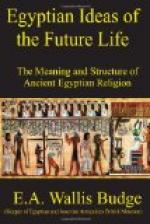It will be remembered that when Isis found the dead body of her husband Osiris, she at once set to work to protect it. She drove away the foes, and made the ill-luck which had come upon it to be of no effect. In order to bring about this result “she made strong her speech with all the strength of her mouth, she was perfect of tongue, and she halted not in her speech,” and she pronounced a series of words or formulae with which Thoth had provided her; thus she succeeded in “stirring up the inactivity of the Still-heart” and in accomplishing her desire in respect of him. Her cries, prompted by love and grief, would have had no effect on the dead body unless they had been accompanied by the words of Thoth, which she uttered with boldness (Ichu), and understanding (ager), and without fault in pronunciation (an-uh). The Egyptian of old kept this fact in his mind, and determined to procure the resurrection of his friends and relatives by the same means as Isis employed, i.e., the formulae of Thoth; with this object in view each dead person, was provided with a series of texts, either written upon his coffin, or upon papyri and amulets, which would have the same effect as the words of Thoth which were spoken by Isis. But the relatives of the deceased had also a duty to perform in this matter, and that was to provide for the recital of certain prayers, and for the performance of a number of symbolical ceremonies over the dead body before It was laid to rest finally in the tomb. A sacrifice had to be offered up, and the deceased and his friends and relatives assisted at it, and each ceremony was accompanied by its proper prayers; when all had been done and said according to the ordinances of the priests, the body was taken, to its place in the mummy chamber. But the words of Thoth and the prayers of the priests caused the body to become changed into a “S[=A]HU,” or incorruptible, spiritual body, which passed straightway out of the tomb and made its way to heaven where it dwelt with the gods. When, in the Book of the Dead the deceased says, “I exist, I exist; I live, I live; I germinate, I germinate,” [Footnote: See Chap. cliv.] and again, “I germinate like the plants,” [Footnote: See Chap. lxxxviii. 3.] the deceased does not mean that his physical body is putting forth the beginnings of another body like the old one, but a spiritual body which “hath neither defect nor, like R[=a], shall suffer diminution for ever.” Into the S[=A]HU passed the soul which had lived in the body of a man upon earth, and it seems as if the new, incorruptible body formed the dwelling-place of the soul in heaven just as the physical body had been its earthly abode. The reasons why the Egyptians continued to mummify their dead is thus apparent; they did not do so believing that their physical bodies would rise again, but because they wished the spiritual body to “sprout” or “germinate” from them, and if possible—at least it seems so—to be in the form of the physical body. In this way did the dead rise according to the Egyptians, and in this body did they come.




